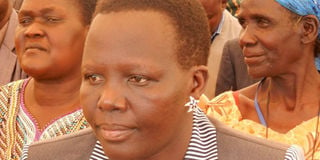Oyam women to use sex as tool for agricultural production

Oyam Resident District Commissioner, Ms Jillian Akullo. PHOTO BY BILL OKETCH
What you need to know:
- Mr Adea Akar further advised women to try this trick just for one week since “lazy men will feel the pain of being denied sex and start helping their wives with garden work”.
- The Resident District Commissioner, Ms Jillian Akullo, urged the locals to consider bulk marketing if they are to have bargaining power and fetch better prices.
If you thought sex is only for procreation or leisure then you are missing a point.
In Oyam District of northern Uganda, a group of women has discovered that since their men cannot do without sex, they can use it as a tool for increasing agricultural production and productivity. How will they undertake this task? Simple! Ms Hellen Odur, the chairperson of women’s farmer group, said lazy men would be denied sex!
These women argue that if lazy men are denied sex, they would be forced to assist them in the farm and thus leading to increased food production.
Oyam LC5 chairman, Mr Nelson Adea Akar, agreed that sex could be a very vital tool in poverty alleviation. He challenged women to stop offering free sex to lazy husbands who are unwilling to farm but only wasting their energies on consuming alcohol.
Mr Adea Akar further advised women to try this trick just for one week since “lazy men will feel the pain of being denied sex and start helping their wives with garden work”.
“Somewhere in Apac District, women tried this trick and it worked so well. If your husbands are lazy and are not helping you with garden work, go and dig alone, but at night when they ask for sex don’t give them. It will not even take one week before they start going together with you to the garden and even working harder to please you so that they can benefit from sex at night,” Mr Adea told women last Thursday.
He was speaking during the commissioning of a multi-million modern milling machine donated by the Ministry of Agriculture to the women’s farmer group in Abok Sub-county.
Oyam District production coordinator, Mr Tommy Opio, said the equipment valued at Shs500 million should be used for value addition.
“This machine is for the farmers, it is meant for the community to use it for value addition, but in order to effectively benefit from it, you should form yourselves into a cooperative society,” Mr Opio said.
“To register a cooperative society, you pay Shs 20 million and you need to be a minimum of 30 members but you can even be as many as 1,000. So if each of the 1,000 members pays Shs 20,000 you can be able to raise the Shs 20 million within a very short time.”
The district community development officer, Mr Geoffrey Ogwal, said the machine has the capacity of grinding 1000 kgs of maize per hour.
The LC5 chairman urged the community to take advantage of the opportunity to add value to their produce by processing it so that they can sell it at a much higher price to earn better income.
“There is a lot of money in farming. What farmers earn in a year is far higher that the earnings of civil servants in this country. What you need to do is to adopt modern farming practices and just within three months, you will be able to graduate from grass- thatched huts to permanent houses,” Mr Adea said.
Ms Hellen Odur, the chairperson of the interim management committee of the grinding mill project complained that they are only 30 members and unable to raise the Shs20 million needed to register their group as a cooperative.
The Resident District Commissioner, Ms Jillian Akullo, urged the locals to consider bulk marketing if they are to have bargaining power and fetch better prices.
“Middle men are now moving around monitoring people’s gardens and checking the size of what they have grown. It is very painful to find that farmers are selling their crops very cheaply from the gardens,” the RDC noted.
She said there are some female traders who are cheating men who take their produce for sale at the local markets.
“These women cheat men by squatting and exposing their thighs. When they are measuring the produce in cups, men concentrate on looking at the thighs instead of counting the number of cups of their produce,” the RDC noted.


